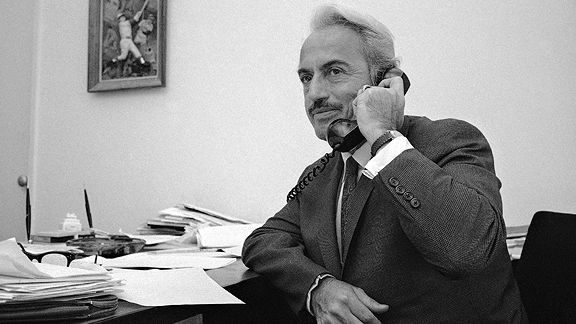
This wouldn’t be happening on Marvin Miller’s watch.
Most baseball fans are aware that there are two words that should never be mentioned in polite company in conjunction with the sport; the “S” word (steroids), and the “C” word (collusion).
Interestingly, both have (indirectly) raised their ugly heads this offseason. With eight of the top ten free agent players sitting at home, unsigned, three weeks before training camps open, something certainly seems to be amiss. The fact of the matter seems to be that players who have reached that exalted status (free agency) are not being snapped up at the frenetic pace that was the norm in years past.
Where does the “S” word (steroids) come in? Well, there was a time, (say, 1995 -2006), when veteran players’ performance had seemingly stopped declining. Stars routinely played at a high level well into their 30’s, many signing more than one multi-year deal after becoming a free agent. There were many reasons; offseason training, nutrition, rest, advances in sports medicine, but the one that continued to raise its ugly head was PED’s. Regardless of how many players were suspended (or suspected), once testing came in (2006), player’s performance relative to age gradually returned to more normal levels.
This was the era in which big-money veteran contracts made the most sense; when a given level of performance from a veteran player could be relied upon for an extended period. In the decade or so following 2006, it seems a new era has dawned.
A test case, of sorts, may well have been seen last year, when Edwin Encarnacion turned down the multi-year offer made by the Toronto Blue Jays right after the 2016 postseason, expecting a bidding war between teams like the Red Sox (who had just lost David Ortiz to retirement) and the Yankees (who were finally out from under the mega-contracts due A-Rod, Carlos Beltran and Mark Texiera). Disappointed, Edwin ended up signing with Cleveland just before Christmas, for less than Toronto had offered.
In the past, teams would sign an aging free agent star for multiple years to take advantage of the first one or two seasons, when his production would still be close to its peak. Now, it would seem, the clubs have decided that mortgaging their future to win now is folly, and are content to live and die by their young stars. Teams with stars signed to long-term deals are, in fact, now trading them away.
But is it the dreaded “C” word (collusion)? Have Major League teams just decided to employ enlightened self-interest? Are analytics departments, as first explored in “Moneyball“, just as effective at tracking the declining performance of veteran players as finding diamond-in-the rough Bush Leaguers ?
This is what the 30 Major League teams would have you believe. The message seems to be: “We’ve smartened up. We’re tired of overpaying for “veteran presence” and “good influence in the clubhouse” and all those other old bugaboos that were excuses for shelling out on a declining veteran player.”
And, to be fair, analytics do seem to be helping talent evaluation, at least at the amateur end of the scale. The days of first-round draft picks being complete busts, never making it to the majors at all, seem well behind us.
But ALL 30 TEAMS? It seems unlikely. It’s definitely not your father’s collusion. “Collusion” in the 1980’s sense meant (then-commissioner) Peter Uberroth ordering teams not to sign one another’s free agents, and then daring them to defy him. Now, if this is some form of the “C” word, it’s no longer about restricting player movement; it’s simply about suppressing salaries.
A majority of baseball’s brightest stars are now in the under-30 age bracket. These players, in addition to being young, are also cheap; most have yet to reach the six years’ service time necessary to test their value on the free agent market. This represents a double win for the club; a marketable star, with the attendant performance, at a bargain-basement price!
Will the cycle be broken? Well the second tenet of “Moneyball”, after embracing analytics, is not following convention. Billy Beane made his reputation as much by zigging when everyone else zagged as he did by discovering new means of player evaluation. What if he, or someone like him, suddenly decided that the best bargains were still on the shelf, and convinced some significant free agents to take a flyer on a short-term deal and win one now, with him? It’s not beyond the realm of possibility, especially if said players are feeling vindictive after being shown such disrespect.
We shall see…